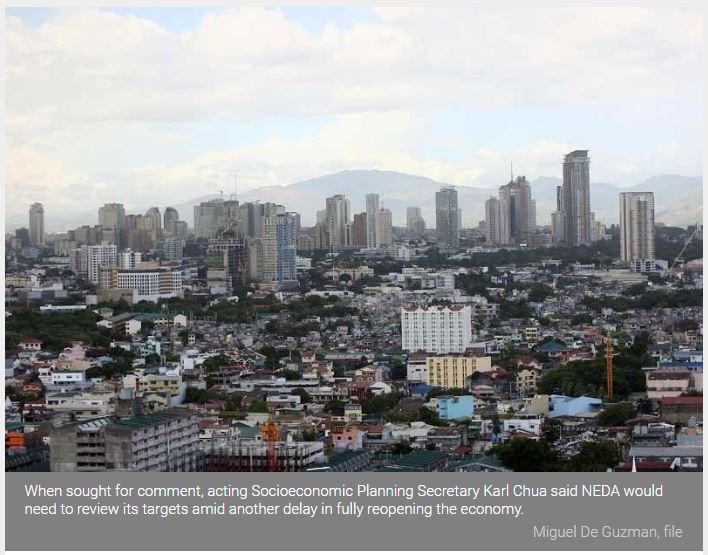Philippines: NEDA to review GDP goal
MANILA, Philippines — The National Economic and Development Authority (NEDA) will have to reassess the country’s economic target for the year after President Duterte decided to forgo a plan to put the Philippines under the most lenient quarantine status until mass vaccination has started.
When sought for comment, acting Socioeconomic Planning Secretary Karl Chua said NEDA would need to review its targets amid another delay in fully reopening the economy.
From the earlier eight to 10 percent growth forecast, NEDA revised its growth target to 6.5 to 7.5 percent this year, dependent on the following factors: shift to a modified general community quarantine (MGCQ), implementation of the recovery program, and timely COVID vaccination.
“We support his (Duterte) decision and will work hard to roll out the vaccine so that we can further open the economy,” Chua said.
The Foundation for Economic Freedom (FEF), however, maintained that the delay in shifting to the “less restrictive” MGCQ was a significant setback to economic recovery.
FEF president Calixto Chikiamco said the government, at the very least, should have expanded the list of regions under MGCQ and only retained certain local government units with COVID-19 cases under GCQ.
“Very doubtful (on achieving GDP target). Even the arrival of vaccines is uncertain. The government has failed to sign a supply agreement so far with any of the vaccine makers,” Chikiamco told The STAR.
“The government should urgently pass the economic liberalization measures in order for the economy to quickly bounce back after MGCQ is declared,” he said.
Dutch financial giant ING Bank senior economist Nicholas Mapa, for his part, said quarantine restrictions were not exactly to blame for the lackluster spending and the drop in investment outlays.
“Moving to relax restrictions will have only a modest impact on overall spending as the more likely impediment to consumption is the lack of consumer confidence,” Mapa told The STAR.
He said insipid consumption is due to poor consumer confidence, which in turn is weighed down by still elevated unemployment rates and the general anxiety of catching the virus.
“People are not spending because they do not have a job or are not as confident in employment prospects to warrant shopping for pseudo luxury items and cheap thrills during a recession. People are not out and about because they fear the virus and crave access to a credible vaccine and not because the malls close at 7 p.m. instead of 9 p.m.,” he said.
“Authorities continue to believe that relaxing restrictions will unleash potent consumption like a race horse charging out of the gates. Instead, once mobility curbs are relaxed, we will see the once formidable stallion limp off the track, bearing deep and lasting scars from the ongoing recession,” Mapa said.
Further, Mapa said growth momentum would still be subdued, regardless of the type of community quarantine status, as vaccines are still out of reach.
“The one true antidote to the lack of confidence would be the vaccine procured by the government as this would generate GDP momentum via increased government expenditure while simultaneously curing Filipinos’ anxiety tied to catching the virus,” he said.
On the other hand, Ateneo de Manila University economist Alvin Ang emphasized that vaccine rollout and lowering of cases are more crucial elements for recovery as easing restrictions will require that these be in place to boost confidence.
Rizal Commercial Banking Corp. chief economist Michael Ricafort told The STAR the government’s GDP target could still be achieved as long as long as additional measures to re-open the economy including easing of restrictions on public transportation, are put in place.
“There should also be increased government spending especially on infrastructure, especially in view of the preparations for the 2022 presidential elections to complete various government and infrastructure projects,” he said.
Source: https://www.philstar.com/business/2021/02/24/2079886/neda-review-gdp-goal


 Thailand
Thailand




